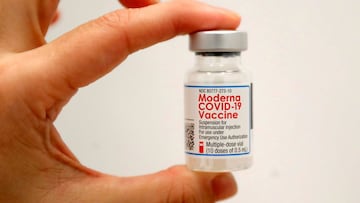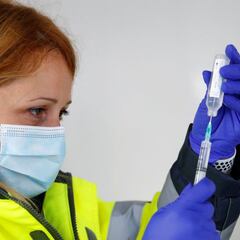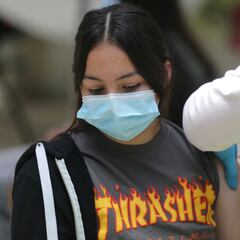Moderna covid-19 vaccine: what is SM-102?
Without lipids neither of the two mRNA vaccines that are currently being used in the fight against covid-19 would be possible, SM-102 is one of them.

A new type of vaccine is being employed against the covid-19 virus that came out of a scientific backwater but could now create a medical revolution helping countless around the world. In order for the vaccine to reach its destination in one piece, it requires a protective covering of lipids, one of which has wrongly drawn the attention of anti-vaxxers.
The field of messenger RNA (mRNA) has jumped into the spotlight as first Pfizer-BioNTech and then Moderna managed to get a working covid-19 vaccine using this technique approved for emergency use by the FDA before their competitors. However, it would all have been for naught without work performed over decades to develop the lipids needed to allow the workhorse of the vaccine slip into the cell where it can begin the inoculating process.
Also see:
- Can the second dose of covid-19 vaccine be different from the first?
- Coronavirus US: who has to wear a mask after the vaccine?
- New travel rules for vaccinated Americans
- How to prove you’re vaccinated so you don’t need to wear a mask
What is messenger RNA (mRNA)?
Messenger ribonucleic acid (mRNA) is a single-stranded molecule and are one of the types of RNA that are found in cells. When a mRNA is introduced in a cell, the translation machinery that makes proteins, binds to the mRNA molecules and reads the code on the mRNA to make a specific protein. Thanks to research by Katalin Karikó, a hungarian biochemist, and Drew Weissman, an immunologist at the University of Pennsylvania they made using mRNA the leading technology in the covid-19 vaccine race.
These short-lived strands of genetic material are the key ingredient of the Pfizer-BioNTech and Moderna vaccines, prompting our cells to start making the spike protein that the covid-19 virus uses to latch on and invade cells thus infecting them. Once our cells start producing the spike protein our body’s immune system recognize those spike proteins as an intruder in the body, creating an immune response. The immune system creates antibodies to thwart the spike proteins attempts to gain access to our cells so that when the real covid-19 virus enters our bodies the spike proteins on the virus are rendered ineffective.
But the world is a hostile place for mRNA, enzymes in the environment and in our bodies are quick to chop it to pieces. Additionally, mRNA strands are large and negatively charged and have difficulty traversing the protective lipid membranes of cells. This is where SM-102 and a few other lipids in the mRNA vaccine come in.
Today we are spotlighting Dr. Katalin Karikó, a @BioNTech_Group scientist whose early research into #mRNA laid the foundation for the successful vaccines made by #PfizerBioNTech and #Moderna.
— Healthcare Heroes Fund (@HealthHeroFund) May 18, 2021
You can nominate a #healthcarehero here: https://t.co/qRCQbxkhLC pic.twitter.com/zi7stIjdE1
What is a lipid and what is SM-102?
Lipids are a type of fatty acid and without them the mRNA instructions in the covid-19 vaccine would not be able to get to the desired destination. The mRNA uses lipid nanoparticles, or LNPs, which are tiny balls of fat create a lipid shell. The Moderna and Pfzier-BioNTech use four LNPs: ionizable lipids whose positive charges bind to the negatively charged backbone of mRNA, pegylated lipids that help stabilize the particle, and phospholipids and cholesterol molecules that contribute to the particle’s structure.
In the case of the Moderna vaccine the ionizable lipid ingredient is called SM-102. The other three LNPs are polyethylene glycol [PEG] 2000 dimyristoyl glycerol [DMG], 1,2-distearoyl-sn-glycero-3-phosphocholine [DSPC] and cholesterol.
Scientists debunk conspiracy theory surrounding SM-102
Anti-vaxxers are spreading a conspiracy theory on social media claiming that SM-102 is not safe for human use. Many of the social media posts and videos feature the US biochemical manufacturing company Cayman Chemical which sells SM-102 as a research chemical. On the product description page for the company’s SM-102, chloroform is listed as part of the formulation, “a solution in chloroform”.
Fears over SM-102 COVID vaccine ingredient debunked by scientists https://t.co/eAcqhpGgLf
— Newsweek (@Newsweek) May 18, 2021
Related stories
This is being latched onto by anti-vaxxers but as is pointed out by interviews with scientists in Newsweek, this is ingenuous and easily misinterpreted. Just because this company says it sells its SM-102 product "for research use only, not for human or veterinary use" does not imply that the SM-102 Moderna uses is not safe. Furthermore, chloroform is not listed among the ingredients of the Moderna vaccine.
Al Edwards, impact lead for the pharmacy research division at the University of Reading, told Newsweek "A seller can label something as not for human consumption or use in medicines just because they don't want the product to be used in that way; the business does not want to certify that it's safe for human use." Adding "Peanuts sold for bird seed often are labelled in this way. That doesn't mean peanuts are hazardous to humans."


